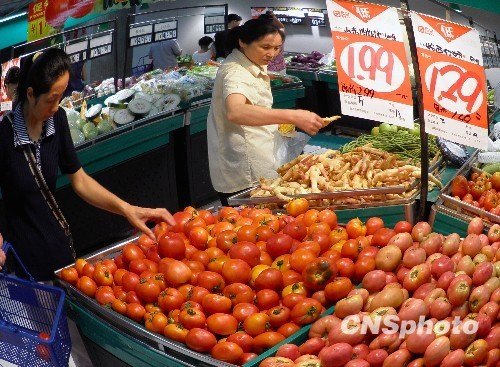(Ecns.cn)--With the seven-day National Day holiday commodity prices gained momentum and are now posed for a new surge in early October.
Statistics as of September 9 from the National Bureau of Statistics (NBS) suggested that though China's Consumer Price Index (CPI) slightly eased to 6.2% in August from July's 6.5%,which marked the peak of the cycle so far, inflation still rose 0.3%.
According to a report in the Southern Daily, various commodities witnessed significant price hikes during the Mid-Autumn Day holiday from September 10 to 12.
The latest data from the NBS revealed that food prices in August increased by 13.4%,with prices of meat up 29.3%. Pork prices soared by 45.5%,the highest in that category.
The biggest increase was recorded in spirits, where prices increased 9.7% for the year as of July, according to CPI data released by NBS. Beer prices rose by 9.5%, putting further pressure on pubs and brewers.
On September 10, Leading Chinese liquor producer Wuliangye Yibin Co Ltd raised the ex-works prices of its Wuliangye-branded liquor products by 20%-30% ahead of the holiday season in China.
Wuliangye's price hike followed a similar move by its major rivals, including Moutai, Luzhou Laojiao, Shanxi Xinghua Cun Fen Chiew (Group),Jiangsu Yanghe Distillery Co Ltd, and Chengdu Swellfun Marketing Co Ltd.
Experts noted that the holiday economy, which is promoted by the country in a bid to expand domestic demand and invigorate the domestic market, has been constantly mired in price surges, an occasion the merchants take advantage of in order to pocket tidy profits.
Though the National Development and Reform Commission (NDRC), the nation's economic planner and top pricing authority, had required liquor makers to "keep prices stable" at a meeting on September 16, many still chose to raise prices, claiming that "they are challenged by rising costs and large demands."
Insiders pointed out that expanding demands from consumers during the holidays have led to a short supply of liquor, which would eventually result in price hikes.
The Guangzhou Daily commented that the surge was closely related to the macroeconomic environment, not a mere seasonal problem.
The government's approach was therefore criticized by experts as an inappropriate administrative intervention that only scratched the surface.
The Economic Information Daily added that even if the price surge could be brought down through government efforts, it would not last long. It is expected that prices of high-end liquors will increase again either this year or during the first half of next year.
The article also suggested that such problems should be solved by the market itself. Moreover, the government should adopt more effective measures than administrative intervention, such as monetary control, regulation and supervision.
The CPI will remain high at 6.0% to 6.2% in September, predicted Sealand Securities, adding that the inflation will not likely ease in a short period.
Song Guoqing, professor at the China Center for Economic Research at Peking University, pointed out that China will continue focusing on taming inflation.
"As farm yields in summer increased, the grain output in autumn is expected to be quite promising. Economies in the U.S. and European countries are still slowing down, and prices for staple commodities are falling in world markets, which has created favorable conditions for China to curb inflation," Song said.
However, the China Daily argued that Consumers will still face moderate grain price hikes this year, despite the country seeing a bumper harvest.
"Prices will go up moderately due to higher farming costs, as well as the impact of international markets. But the rise will be limited," Chen Xiaohua, deputy agriculture minister, told the state-run newspaper September 29.
On September 28, the NDRC announced it would raise the minimum purchase price for wheat from farmers in 2012. "The move aims to protect farmers' enthusiasm to grow grain and further stimulate production," Chen added.
The People's Bank of China has also raised the benchmark interest rate five times and lifted the required reserve ratio nine times since last October as part of efforts to tackle rising domestic price levels.
But due to the anticipated easing price pressures—coupled with rising turmoil in global markets—the Chinese government may loosen its policy, including cutting the required reserve ratio, if consumer inflation eases on a sequential basis in September, reported the Market News International on September 23, citing Wang Songqi, researcher with the Chinese Academy of Social Sciences.
"If the CPI falls month-on-month in September then the government will have the conditions needed to loosen monetary policy and there would be the possibility of a cut in the required reserve ratio," said Wang.


















